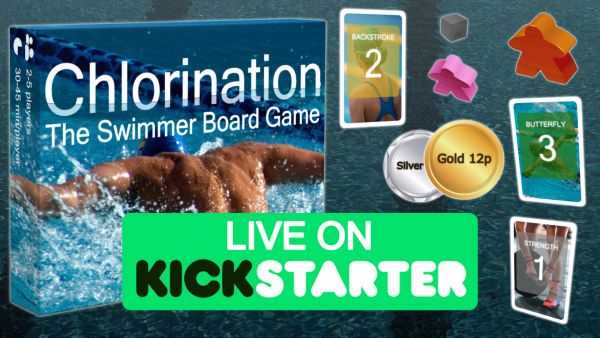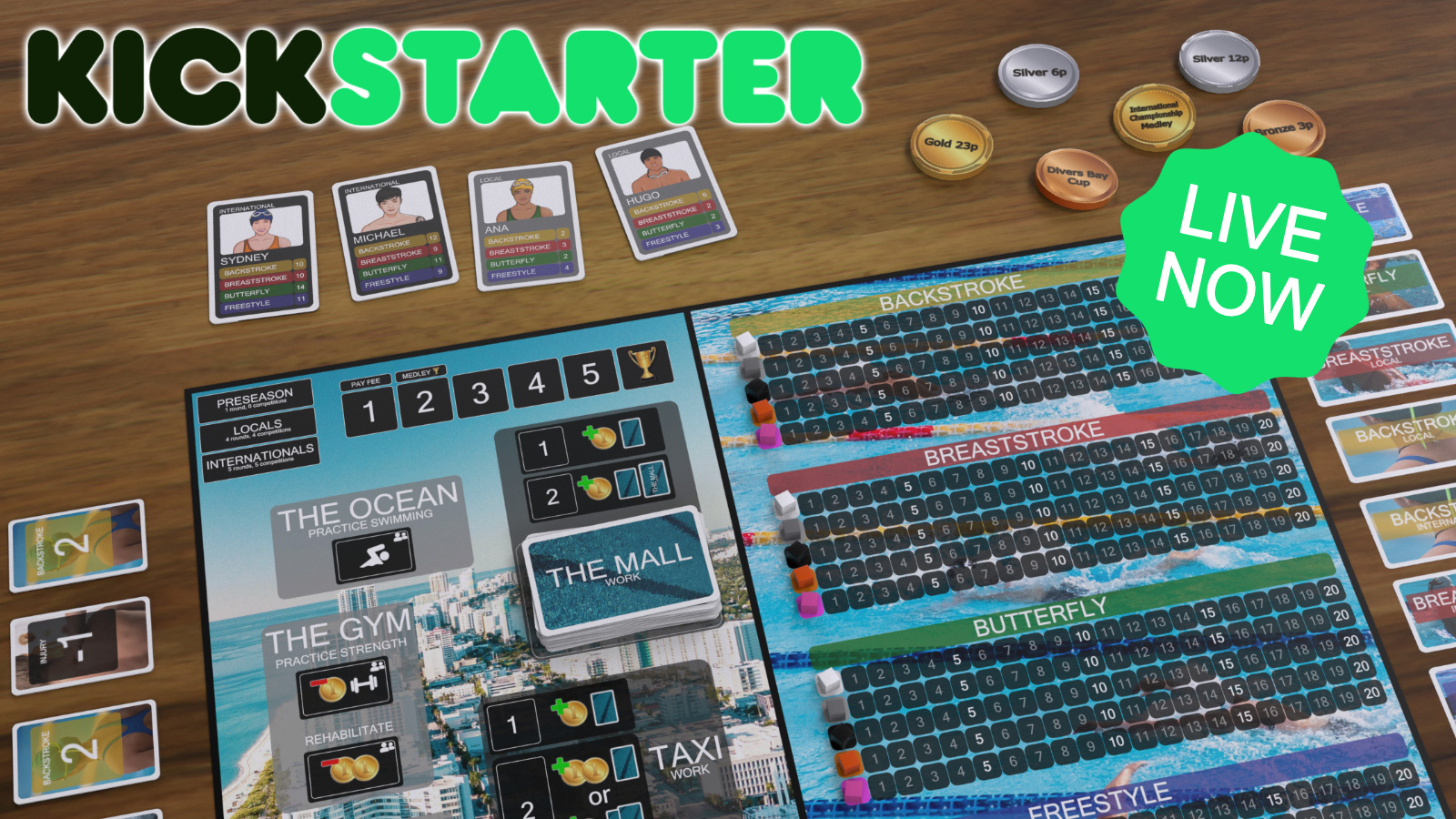Preview: Work, Train, and Compete in Swimming Game Chlorination

From local competitions to international, swimming board game Chlorination takes you from part time jobs to intensive training, in order to win those coveted gold medals.
Coming soon to Kickstarter, Chlorination is an action selection game with an underused theme. So how well does the world of swim competition translate to a board game?
Gameplay
The board is placed in the center of the table. The left side of the board shows the various locations you can go to take actions each round. On the right side, you have point trackers for four different types of swim styles: butterfly, backstroke, breaststroke, and freestyle. Each player chooses a player color and places a token on each track. This represents your skill level in those styles. If playing with fewer than five players, you draw swimmer cards and place their tokens at different points on the tracks based on their skills listed on the cards. Before the international competitions, you will draw new, more skilled swimmers to compete against.
At the start of the game, the four local competition cards are shuffled and then laid out face-up on the table. Each competition focuses on one of the four swim styles, and this is the order the competitions will occur in. You do the same for the international competitions, which happen after the locals.
During the first round of the game there are no competitions, as this represents the 'preseason'. At the start of each subsequent round, all players must decide at the same time if they will compete in that round's competition. The local competitions each cost three coins to compete in while the international ones cost four (including the final medley during the final round).
Each round, players take turns moving their meeple to a location on the board and taking the action there. You can either go to one of the work locations to earn money and skill cards, or you can go to one of the training locations. From the second round onward, if you do not compete in the competition, you get to take a sixth bonus action.
Some locations have several spaces which are numbered and placed in ascending order. When you move your meeple to one of these, you must place it on the space numbered one. Next turn, if you choose to keep your meeple at that location you move it to the next higher numbered space, and so on. Each higher numbered space offers a better reward.
There are three types of places you can work: the mall, driving a taxi, or the post office. Only one player can be on a single numbered work space at a time. Each work place gives you money and skill cards each turn you spend there. The post office also lets you increase one point in each swim style if you stay there for three turns in a row, the taxi allows you to earn extra money or skill cards on the second turn you are there, and the mall lets you draw a mall card if you stay there two turns. Mall cards can be played for extra bonuses such as extra money or discarding injury cards.
When you earn a skill card, you may choose one of the five in the display and add it to your hand or you can draw the top card of the deck. However, if you draw an injury card, you must place it in front of yourself. As long as you have an injury card in play, it will lower your score in each swim category by one point. One of the available actions you can perform on the board is to spend two coins in order to discard an injury card. Other than injury cards, each skill card corresponds to one of the four swim styles and has a value of two or three. There are also strength skill cards with a value of one.
Finally, there are three places you can train: the ocean, the gym, and the pool. In order to train you must discard the number of coins shown on the location space and play a skill card. You then move your token up on the corresponding tracker the number of points shown on the skill card. Strength increases each tracker by one. You can also play two skill cards or a matching type, to act as any other swim style. You will then increase the chosen style by two points.
You may only use strength skill cards to practice at the gym or pool, and you may only use swim skill cards at the ocean or pool. The ocean is free to train in, but if you remain at the pool two turns in a row you get to draw a pool card in addition to training. Pool cards give you an extra perk such as waiving your next competition fee or letting you train at the gym for free.
Each round, after each player has taken five actions, you compete in that round’s competition. You check the cards dealt at the beginning of the game to see which competition type is up next and then award gold, silver, and bronze medals to the players with the first, second, and third most points in that swim style.
During the tenth and final round, each player only takes two actions and then the medley competition occurs. The medals are awarded based on players’ combined points in all four swim styles.
Players then add up all the points from their medals. Medley medals are worth the most points, while international medals are worth more than local medals. The player with the most points from all their combined medals wins the game.

Review
Chlorination is a game about figuring out which actions to prioritize across limited turns. Which competitions do you compete in, how do you spend your money, and what skills do you want to push?
The choices presented each round are interesting and layered. Do you want the jobs that will pay more over time? The ones that can get you cards? How about where you want to train? You need to balance your money to make sure you have enough to compete but you also can’t train all skills at all locations. Can you afford to spend money on the pool to get those pool cards?
In addition to all these considerations, you’re going to be changing your mind based on how other players increase their skills and the order those competitions will occur in as well as what skill cards are available to you.
We did prefer the game at higher player counts as it’s just more interesting to be competing against more players rather than randomly drawn swimmers, and it forces you to adapt your plans more based on the actions of the other players. The player interaction in this game is quite good, as you respond and react to each other and how you all increase your skills in the four styles.
It is a nice touch that you know right out the gate exactly which competitions will occur in which order, so there’s no luck involved there and you can train appropriately, while skill card draws still mean you have to adapt based on the options at your disposal.
The layout of the board is well designed, with the information clearly presented and the iconography fairly easy to read. The cartoony artwork on the swimmers is not a great fit for the more realistic aesthetic of the rest of the game, but this is a fairly minor nitpick.
We enjoyed the way the theme is presented here, with players not simply competing, but also having to focus on training as well as day jobs. It felt like a more nuanced presentation of a sports theme and felt like those medals were well earned.
Even if sports themes aren’t usually your favorite, Chlorination is an engaging and clever game that manages to pack plenty of player choice and strategy into an easy-to-learn rules set. Dive into its Kickstarter and check it out for yourself.
Pros: Well implemented theme, interesting choices each turn, solid player interaction without take-that elements
Cons: Better at higher player counts, artwork on the swimmer cards does not fit the rest of the game
Disclosure: this preview is based on our evaluation of an unpublished prototype of the game, which is subject to change prior to publication. While a modest payment was received to expedite the review process, our thoughts and opinions expressed here are honest and accurate.




